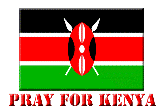I wonder how you can live side by side, with your neighbours, and then one day chinja them.
I understand from the reports that I read of the Eldoret church killings, that the attackers were calling out to the people in the church by name. I was brought up to believe that churches were sanctuaries, and you could seek refuge in them, and would not be harmed. Hell, times have changed.
One of the attackers was challenged by a reporter, and asked why he attacked the people in the
church.His response was that, because people were hiding in a church, it ceased to be a church and had become a cave. This then gave him license to chinja and burn these people. I struggle with this way of thinking.
I believe that the issues are mainly socioeconomic, but do not deny the deep rooted tribal tensions. There have been tensions between the Kalenjin and Kikuyu in the Rift Valley, but these killings are not the norm.
These killers are vulnerable and oppressed, their lives are very hard. Most of the wealth in Kenya is shared by the elite. The have nots are outraged, angry and feel cheated. When they went to vote, they had hoped for a change, in the name of democracy. The election was rigged/stolen from them, and this reinforced their beliefs that the thieving elite would continue.
The problem is, that we are not all able to express our distress in the same way. These killers wanted revenge, and felt that the only way they could get back at those responsible, living in Muthaiga and Gigiri, was to hurt Kibaki's ethnic group. There is a perception in some parts of Kenya that Kikuyus dominate and run things. So in their eyes all Kikuyus needed to suffer.
It is tragic that innocent victims have lost their lives.
What do the differences between Mwizi Kibaki and Raila Odinga have to do with the people who have died, become homeless, and do not have access to food and water?
It is the poorest and most vulnerable who suffer from the unrest. Owiti, Kinuthia, Atieno, Wambui, Lelei in Mathare, Kawangware, Kibera and other parts of Kenya.
I had a conversation with my mother earlier today, and she asked me how I would feel if my mbati house had been demolished, and I could not eat.
How would I feel?
I found it difficult to respond, as I was thinking of several issues.
The main issue for me is still who can the Kenyan people trust?
My understanding is that Kikuyus have been transported from the Rift valley to Central Province.
What has happened to ODM supporters who live in PNU strongholds?
The press has reported that most of the deaths are from the Kikuyu tribe. I understand the deaths in Kisumu are as a result of bullets from the police and general service unit.
It is not only Kikuyus and Luos who are dying, other tribes have been affected. My view is that life is precious, and no one life is more important than the other.
Philip Ochieng has a good article on misplaced anger.
Judith Lewis Herman is an authority on Trauma and violence. In her book Trauma and Recovery she says
The ordinary response to atrocities is to banish them from consciousness. Atrocities, however refuse to be buried.
It is very tempting to take the side of the perpetrator. All the perpetrator asks is that the bystander do nothing. He appeals to the universal desire to see, hear, and speak no evil. The victim, on the contrary, asks the bystander to share the burden of pain. The victim demands action, engagement and remembering.
In order to escape accountability for his crimes, the perpetrator does everything in his power to promote forgetting. Secrecy and silence are the perpetrator's first line of defence. If secrecy fails,the perpetrator attacks the credibility of his victim. If he cannot silence her absolutely, he tries to make sure that noone listens. To this end, he marshals an impressive arrayof arguments, form the most blatant denial to the most sophisticated and elegant rationalization. After every atrocity one can expect to hear the same predictable apologies: it never happened; the victim lies; the victim exaggerates; the victim brought it upon herself; and in any case it is time to forget the past and move on. The more powerful the perpetrator, the greater is his prerogative to name and define reality, and the more completely his arguments prevail.
My Kenyan brothers and sisters I believe we are victims but leave you to draw your own conclusions.
Related articles:The depoliticisation of Kenyan politics





1 comment:
Sorry for my bad english. Thank you so much for your good post. Your post helped me in my college assignment, If you can provide me more details please email me.
Post a Comment